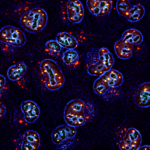Lien vers Pubmed [PMID] – 19239847
Med Sci (Paris) 2009 Feb;25(2):153-60
Cellular senescence, like apoptosis, is now widely accepted as a potent tumor suppressor mechanism operating in normal mitotic mammalian cells. Originally, it was identified as a process that limits the replicative lifespan of primary human cells in culture because of telomere attrition and was therefore termed “replicative” senescence (RS). However, previous findings have demonstrated that a phenotype indistinguishable from replicative senescence, collectively called “stress-induced premature” senescence (SIPS), can be induced without extensive cell division in normal as well as cancer cells by a variety of stresses and signaling imbalances. Recent developments have also indicated that, despite their tumor-suppressive capacity, senescent cells themselves could produce neoplastic cells under certain circumstances and promote the growth of preneoplastic cells, raising the possibility that senescence might function as a biological “Trojan” horse. Here, we take a snapshot of the progress in understanding the causes and consequences of cellular senescence in vitro and in vivo.

